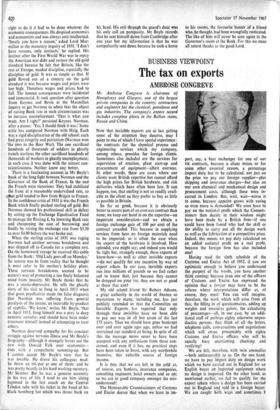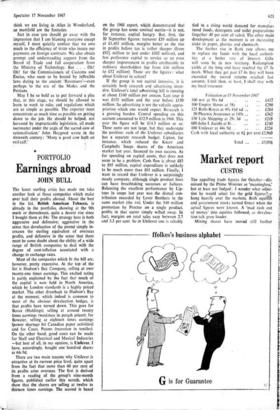The tax on exports
BUSINESS VIEWPOINT AMBROSE CONGREVE
Mr Ambrose Congreve is chairman of Humphreys and Glasgow, one of the largest private companies in the country; contractors and engineers for the chemical, petroleum and gas industries. The company's export record includes complete plants in the Balkan states, Russia and China.
Now that invisible exports are at last getting some of the attention they deserve, may I point to one of which I have special experience: the contracts for the chemical process and engineering services which my Company, among others, provides for foreign clients. Sometimes also included are the services for supervision of erection, plant start-up and procurement of equipment—albeit overseas. In other words, these are cases where our clients want British expertise but cannot afford the high prices for British hardware, and risk deliveries which have often been late. It can happen, too, that sterling is not so readily avail; 'able to the client so they prefer to buy as little as possible in Britain.
So far so good, because it is obviously better to secure part of an overseas contract than none; we keep our hand in on the expertise—an important consideration—and we obtain., a foreign exchange gain of 100 per cent of the contract awarded. This because in supplying services from here no foreign materials need to be imported, as is often the case when the export of the hardware is involved. How splendid, you might say; and indeed you would be right but, strangely enough, these exports of know-how—as well as other invisible exports --do not qualify for any incentive by way of export rebate. In our case, invisible exports run into millions of pounds so we feel rather sad to know that, just because they cannot be dropped on your toe, they are not as good as those that can!
My old school friend Sir Robert Adeane, a great authority in the world of finance so mysterious to many, including me, has just publicly reminded us that the Committee on Invisible Exports has reported that only through these invisibles have we been able to pay our way -in all but seven of the last 175 years. Thus we should have gone bankrupt over and over again ages ago, unless we had restrained our standard of living. In spite of all this the message seems never to have been accepted with any enthusiasm from those con- cerned, and even if it has, no practical steps have been taken to boost, with any worthwhile incentive, this valuable source of foreign income.
It is thus that we are left in the cold as, of course, are bankers, insurance companies, consulting engineers, hotel owners and so on; so we are in good company amongst the mis- understood!.
The Honourable Commissioners of Customs and Excise decree -thif *hen we have to im- port, say, a heat exchanger for one of our UK contracts, because a client insists -or for some other essential reason, a percentage import duty has to be calculated, not just on the price we pay our foreign supplier—plus shipping and insurance charges—but also on our own chemical and mechanical design and procurement costs, although these were in- curred in London. But, wait, wait—worse is to come, because appetite grows with eating so even more is demanded! We even have to pay on the notional profit which the Commis- sioners then decide in their wisdom might have been made by a British firm—if one Could have been found who had the skill or the ability to carry out all the design -work as well as the fabrication at a competitive price. Indeed, this means we pay duty calculated on an added notional profit on a real profit, because the foreign firm has also included one!
Having read the 'sixth schedule of the Customs and Excise Act of 1952, if you are optimistic enough to believe you understand the purport of the words, you have another think coming; because even one of the officers Of Customs and. Excise has expressed the opinion that a lawyer may have to be the referee where interpretations differ as, of course, they must You can well imagine, therefore, the work which will arise from all this; the filling in of questionnaires, adding up weights and mea§tires galore, the calculating of percentages—all, in our case, by an addi- tional staff of perhaps eighty otherwise unpro- ductive persons. Just think of all the letters, telephone calls, conversations and negotiations which will ensue, presumably with eighty Customs and Excise officers who will be equally busy questioning, checking and verifying!
We are left, therefore, with twin anomalies —both unfavourable to us. On the one hand, we have to pay import duty on design work which we have carried out in England for an English buyer on imported equipment where no design is imported. On the other hand, is mentioned earlier, we fail to qualify for the export rebate where a design has been carried out in England and sold to a foreign buyer. We are caught both ways and sometimes- I think we are living in Alice in Wonderland, so manifold are the fantasies.
Just in case you should go away with the impression that I am blaming everyone except myself, I must quickly confess that we owe much to the efficiency of ECGD who insure our payments on foreign contracts. We also obtain prompt and understanding support from the Board of Trade and full cooperation from the Ministry of Technology. But . . . Oh! Oh! for the Commissioners of Customs and Excise, who seem to be bound by inflexible laws dating to the ancient 'Revenuers'—even perhaps to the era of the Medes and the Persians.
May I be so bold as to put forward a plea that, at this stage, we should be allowed to learn to work to rules and regulations which are as simple as possible. The exporter 'milk concentrate as much time as possible on *tting down to the job. He should be helped, not harassed by impracticable legislation, all made sacrosanct under the aegis of the sacred cow of rationalisation.' John Heygood wrote - in the sixteenth century: 'Many a good cow bath an evil calf.'



































 Previous page
Previous page